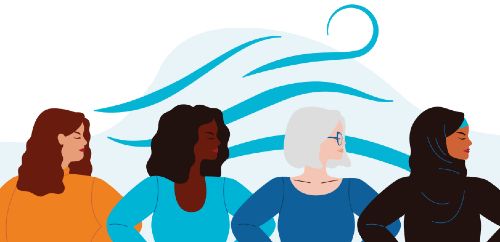
Women’s Centres Mobilize to Call for a Feminist Economic Relaunch
To mark the first day of the Provincial Week of Action, L’R des centres de femmes du Québec releases its Joint Statement for a Feminist Economic Relaunch. Today, centre workers from across the province will meet with 24 MNAs to share with them the joint campaign statement. They also will participate in disruptive actions to underline the importance of including women in economic relaunch plans.
“Women’s centres have been on the frontlines throughout the pandemic. They have stayed politically active, maintained their operations, and have shown much ingenuity in meeting the needs of women during this difficult time,” explains L’R spokesperson Graciela Mateo. To keep up with the evolving landscape and growing needs, every two weeks over a hundred women’s centre workers from across the province participated in joint meetings. “We are confronted daily with how the pandemic is impacting women. This is what drove us to speak out against any post-pandemic economic relaunch that might smack of austerity or focus exclusively on sectors that are either male-dominated or environmentally unsound,” explains Mateo. Alongside a major coalition of organizations and civil society representatives, women’s centres have participated in a variety of actions since the fall to speak out against Bill 66 and to call for an economic relaunch that is not only more just, but also more environmentally and feminist minded.
The campaign statement was drafted based on the discussions, expertize and field experience of hundreds of centre workers as well as members of the Getting Rid of Violence committee. Women — especially women who are racialized — are overrepresented in many of the fields that were hit particularly hard by the health crisis. It is also true that it has deprived more women than men of their jobs. Violence against women has also soared to new heights. This is precisely why the campaign insists that the economic relaunch focus on women workers as well as on the health and welfare of women more generally. The campaign also demands that government work on increasing resilience by, on the one hand, gearing itself up as to help prevent future health crises and better manage their social impacts, and, on the other, by building solidarity and cultivating equity across our communities.
